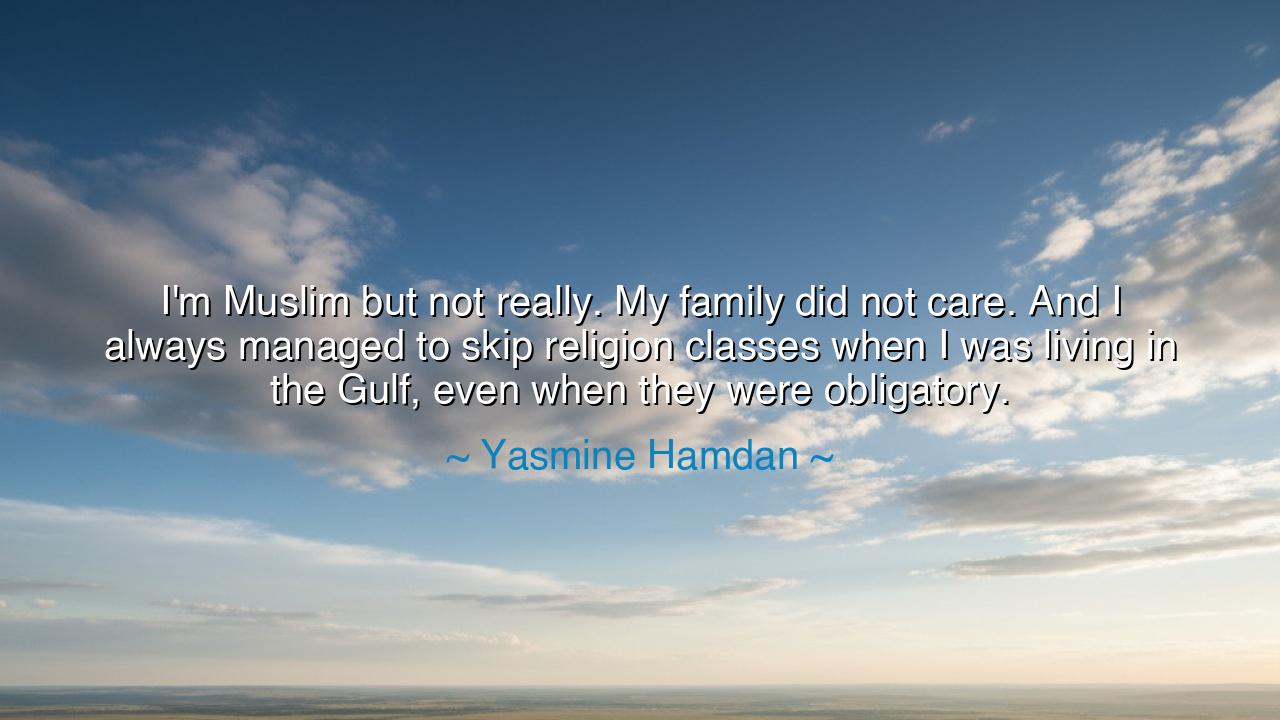
I'm Muslim but not really. My family did not care. And I always
I'm Muslim but not really. My family did not care. And I always managed to skip religion classes when I was living in the Gulf, even when they were obligatory.






In the candid honesty of her words, Yasmine Hamdan, the Lebanese singer and cultural icon, once said: “I’m Muslim but not really. My family did not care. And I always managed to skip religion classes when I was living in the Gulf, even when they were obligatory.” This statement, though spoken lightly, carries the weight of an ancient struggle — the eternal dance between identity and individuality, between the faith we inherit and the freedom we seek. Hamdan’s words are not a rejection of religion but a reflection of the complex, modern soul — one that seeks truth beyond dogma, and belonging beyond boundaries.
The origin of this quote lies in Hamdan’s upbringing — born in Beirut during the civil war, raised across different Arab countries, and later emerging as one of the most influential voices in Middle Eastern art and music. Her life was shaped by movement, by cultures layered and overlapping. In such a life, faith becomes less about form and more about feeling. When she says, “I’m Muslim but not really,” she speaks for many children of diaspora — those who honor their roots yet question their definitions, who love their heritage but do not wish to be imprisoned by it. Hers is the voice of the seeker, not the cynic; of one who refuses to let any single label define the whole of her being.
To skip religion classes, as she did, is not merely an act of rebellion — it is the first act of self-awareness. For Hamdan, as for countless young people growing up under systems where religion is law as much as belief, such small acts are the beginning of thought. In those skipped hours, she was not running away from truth; she was searching for it in her own way. The world around her taught her that faith was something imposed, but her spirit whispered that faith must be discovered. In this quiet defiance, she joined the lineage of those who have sought spiritual freedom — not by denying the divine, but by refusing to accept it secondhand.
History itself holds many such souls. Consider Rumi, the great mystic of Islam, who was born into the faith of rules but found his liberation in the faith of love. He transcended the walls of doctrine and wrote, “I am not Christian, nor Jew, nor Muslim; I am the breath of spirit.” His words echo centuries before Hamdan’s, yet they share the same essence: that to know God — or to know oneself — one must move beyond the divisions of ritual and name. Both Rumi and Hamdan, in their own ways, remind us that faith without freedom becomes fear, and religion without questioning becomes routine.
Hamdan’s statement, though personal, reflects a wider truth of the modern age: that many live between tradition and transformation, belonging to a religion by heritage but to the world by experience. It is a condition of the heart that longs for meaning but not confinement. She reminds us that one can honor the sacred without obeying every rule, and one can love the divine without being bound by the institutions built around it. Her honesty is the kind of courage that moves civilization forward — for when a person dares to question, she reclaims the right to believe freely, and in doing so, she restores dignity to belief itself.
The lesson, then, is not to reject faith, but to make it your own. If you were born into a religion, do not follow it blindly — understand it deeply. And if you find no truth in its walls, seek the divine beyond them. Question not to destroy, but to awaken. Respect the traditions of your ancestors, but remember that you, too, are a child of time — called to interpret the sacred in your own generation. Faith is not inherited like property; it must be chosen, cultivated, and lived.
So, my children, let Yasmine Hamdan’s words be both mirror and challenge. Be brave enough to say, “I am — but not completely.” In that incompleteness lies honesty. In that searching lies wisdom. Do not be ashamed of doubt, for doubt is the doorway through which understanding enters. The divine does not fear your questions; it invites them. For only the mind that seeks can find, and only the soul that dares can truly believe. Faith that is free is the only faith worth having.






AAdministratorAdministrator
Welcome, honored guests. Please leave a comment, we will respond soon